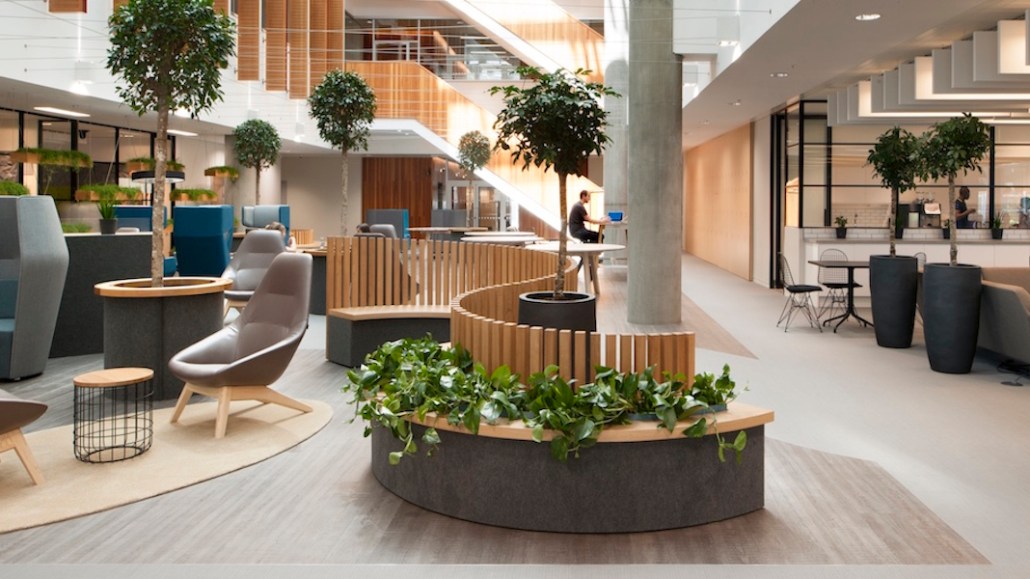Secure your place at the Digiday Media Buying Summit in Nashville, March 2-4
Yoox Net-a-Porter’s new ‘temple of innovation’ focuses on AI and mobile commerce


At Yoox Net-a-Porter Group’s new Tech Hub, which opened last week in London, artificial intelligence, mobile commerce and personalization are the center of the 500-person team’s focus.
“This is our temple of innovation,” said Yoox Net-a-Porter CEO Federico Marchetti in a video announcement for the Tech Hub’s opening. “Our goal is to transform this company to focus on mobile, because that’s where the customer is going. Mobile is at the center of our technology.”
Across the Yoox Net-a-Porter Group — which was established in 2015, following the merging of the two luxury e-commerce sites (Yoox and Net-a-Porter) and also operates The Outnet and Mr. Porter — mobile sales account for about 50 percent of company revenue. Marchetti has pointed out that the company’s customers are comfortable making big purchases on their phones, including a $130,000 watch that was recently sold by a personal shopper through the Net-a-Porter app. Currently, Yoox Net-a-Porter considers itself “mobile-first;” the goal of the Tech Hub is to drive it to become “mobile-only,” according to Marchetti.
According to the company’s five-year strategic plan that was released in 2016, the plan is to double the size of the company through increased investment in mobile and technology. Yoox Net-a-Porter plans to increase its spend on tech and data science by $567 million, as well as increase its share of mobile sales to 75 percent by 2020. With the addition of more jobs in the Tech Hub, the company’s technology team will exceed 1,000, as 500 jobs in the department also exist at the group’s Italian headquarters.
“Mobile-only” is somewhat hyperbolic, according to Jason Goldberg, svp of content and commerce at SapientRazorfish, but it’s evidence that the company has its head in the right place.
“We want to take that with the understanding they’ll still have other channels available, but their customer is moving to mobile,” said Goldberg. “It’s perfectly reasonable, if you’re seeing your customers are shopping there and you’re following them there.”
Marchetti said artificial intelligence is the most sophisticated technology that will be a focus of the Tech Hub. While Yoox Net-a-Porter has been using artificial intelligence since 2015, it will continue to expand its capabilities, deploying the technology in order to improve mobile capabilities like image recognition, natural language search, virtual personal styling, personalized recommendations based off of purchase history, and tailored search results based on a shopper’s size and location.
Net-a-Porter plans to bulk up its personal stylists’ ability to recommend smarter products using AI — personal stylists are available to the retailer’s group of “Extremely Important People,” customers who spend upwards of $70,000 per year. While these customers make up just 2 percent of Net-a-Porter and Mr. Porter shoppers, they account for 40 percent of revenue, according to the company. Elsewhere, on WhatsApp, Net-a-Porter built proprietary technology to enable purchasing directly on the platform, where personal shoppers are having one-on-one conversations with customers.
“The retail sector has been slower in its uptake of technologies like artificial intelligence compared to other industries. However, brands and retailers are increasingly tapping more strategically into their data to understand and predict consumer behavior and preferences,” said Paulo Sampaio, a data scientist at retail intelligence firm Edited. “With Yoox Net-A-Porter Group opening a Tech Hub in the UK and investing more in technology, this is another overt indication that the sector is emphasizing the importance of AI and innovation to effectively compete and grow. Today, AI is more than a buzzword.”
Other services Net-a-Porter is building out include a try-on-at-home concierge service, which is available in some cities and lets customers try on clothing while personal stylists wait to take back anything that is not going to be purchased. The program is similar to Amazon Prime Wardrobe, the company’s try-at-home model, which was announced after Net-a-Porter’s service launched. It lets customers order clothing online and only be charged for what they decide to keep.
The company is also testing virtual try-ons for accessories like sunglasses and handbags, but doesn’t plan to extend the tech to outfits. Marchetti still believes that part of the luxury shopping experience should remain offline, and while AI will support the company’s personal shoppers, he doesn’t have any plans to fully replace them with robots.
“I believe in the human mind, not a super automation of everything,” he said. “Personal shoppers sell products, not AI.”
Image of the Tech Hub courtesy of Yoox Net-a-Porter/PH Philip Vile
More in Marketing

Future of Marketing Briefing: AI’s branding problem is why marketers keep it off the label
The reputational downside is clearer than the branding upside, which makes discretion the safer strategy.

While holdcos build ‘death stars of content,’ indie creative agencies take alternative routes
Indie agencies and the holding company sector were once bound together. The Super Bowl and WPP’s latest remodeling plans show they’re heading in different directions.

How Boll & Branch leverages AI for operational and creative tasks
Boll & Branch first and foremost uses AI to manage workflows across teams.








